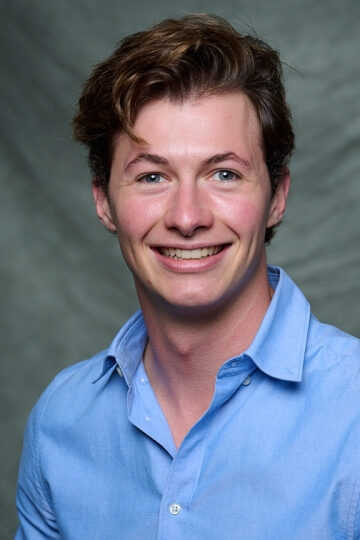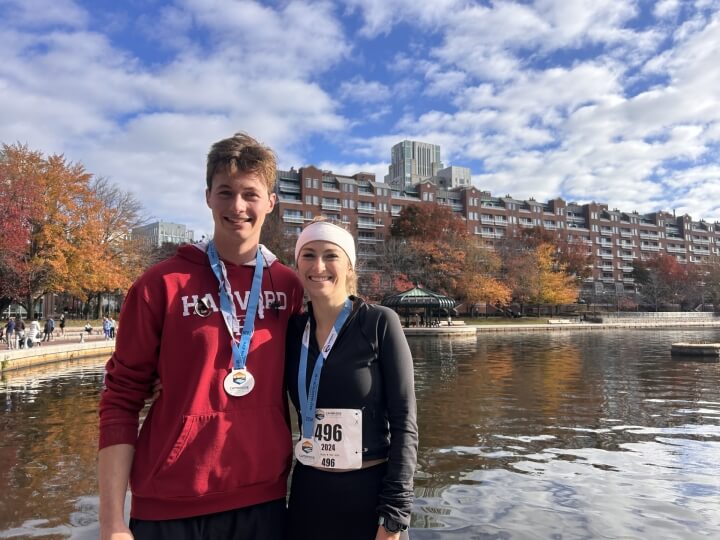News
Michael Finn-Henry, G3 Ph.D. candidate in materials science and mechanical engineering
Trauma surgery and human movement are at the heart of Michael Finn-Henry’s time at the Harvard John A. Paulson School of Engineering and Applied Sciences (SEAS). Finn-Henry is in his third year as a Ph.D. student in materials science and mechanical engineering, where his work in the Harvard Biodesign Lab focuses on developing robots and medical devices that, among other uses, can restore mobility lost to a stroke or conditions such as Parkinson’s Disease. He also is the founder of EndoShunt, a medical device start-up whose technology allows blood to bypass injuries to abdominal vessels, greatly increasing the amount of time a surgeon has to repair the wound before the patient dies from blood loss.
“My academic interests, my research interests, are all about building devices to help people live happy, healthy lives,” Finn-Henry said. “With my background in engineering, how I can do that is by making devices for surgeons.”
A former national team rock climber, Finn-Henry will combine his passion for both movement and trauma surgery when he runs in his first Boston Marathon on April 21. He’s running for the Gillian Reny Stepping Strong Center for Trauma Innovation at Brigham and Women’s Hospital, which funds interdisciplinary research into trauma care for both injured civilians and military. Led by several professors at Harvard Medical School, the Stepping Strong Center was founded in 2014 by Audrey Epstein Reny, whose daughter Gillian was injured and treated at Brigham and Women’s Hospital in the 2013 bombing of the Boston Marathon.
“What I really find inspiring about trauma surgery in particular is that you’re really giving people decades of healthy life back,” Finn-Henry said. “They fund a lot of research like EndoShunt, and my research at Harvard is in the same area. One of the biggest things for me is to be on the other side, not only receiving funding but also helping fundraise and support their mission. With government grants for medical research declining, it is more important than ever to support critical trauma research and community initiatives through organizations like Stepping Strong.”
SEAS student Michael Finn-Henry with Stepping Strong teammate and childhood friend Eline Laurent
Finn-Henry discovered Stepping Strong through Eline Laurent, a childhood friend. The two have been challenging each other, either academically or athletically, since they met at the Carroll School in Lincoln, Mass, which specializes in students with dyslexia. Laurent ran on the Stepping Strong team in last year’s Boston Marathon.
“Eline and I, from a young age, were taking on these big challenges together,” Finn-Henry said. “The first was learning how to read. We’ve always pushed each other to take on daunting challenges. She ran a lot, and she convinced me to run the marathon. I’ve run a good bit, but never this distance.”
A Boston native, Finn-Henry has grown up with the Boston Marathon always in his life.
“Growing up in Boston, I used to watch the Boston Marathon run by,” he said. “My grandmother, 40 years ago she ran her first Boston Marathon with my uncle, and then up until her 70s, she was running marathons.”
Through Stepping Strong, Finn-Henry has already run portions of the marathon course several times, including its signature run through the tunnel near Wellesley College and the notorious Heartbreak Hill near Boston College in Newton. This will be his second-ever marathon, having run the Virginia Marathon in late March.
“The Virginia Marathon was the same weekend as my sister’s wedding, which was in Virginia,” he said. “I was supposed to do a 22-mile training run, and it just so happened that when I showed up, I saw all these signs for the Virginia Marathon. I decided to just do my training run at the marathon, because there’d be water stations. After 22 miles, I decided to just finish it.”
When he’s not training, Finn-Henry is hard at work taking EndoShunt through its $8.5 million Series A funding round. EndoShunt, which won its track in the 2024 President’s Innovation Challenge, recently received a pediatric indications grant from the U.S. Food and Drug Administration (FDA), which will help speed up its path from animal testing to human trials and eventual market deployment.
“When we had to go to the FDA and present all this data, something we realized was that about 25% of our patient population is under the age of 18,” he said. “So to be able to focus on and help our pediatric population would be huge. The FDA gave us a special pediatric grant, and we now have a liaison at the FDA who’s working with us to fund development for pediatric patient care, and help us get FDA clearance to work with actual pediatric patients. The FDA has been really supportive of us.”
Topics: Health / Medicine, Materials Science & Mechanical Engineering
Cutting-edge science delivered direct to your inbox.
Join the Harvard SEAS mailing list.
Press Contact
Matt Goisman | mgoisman@g.harvard.edu




